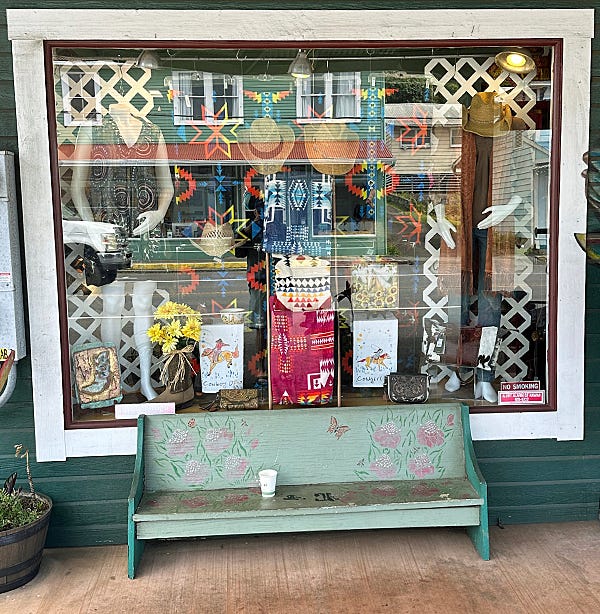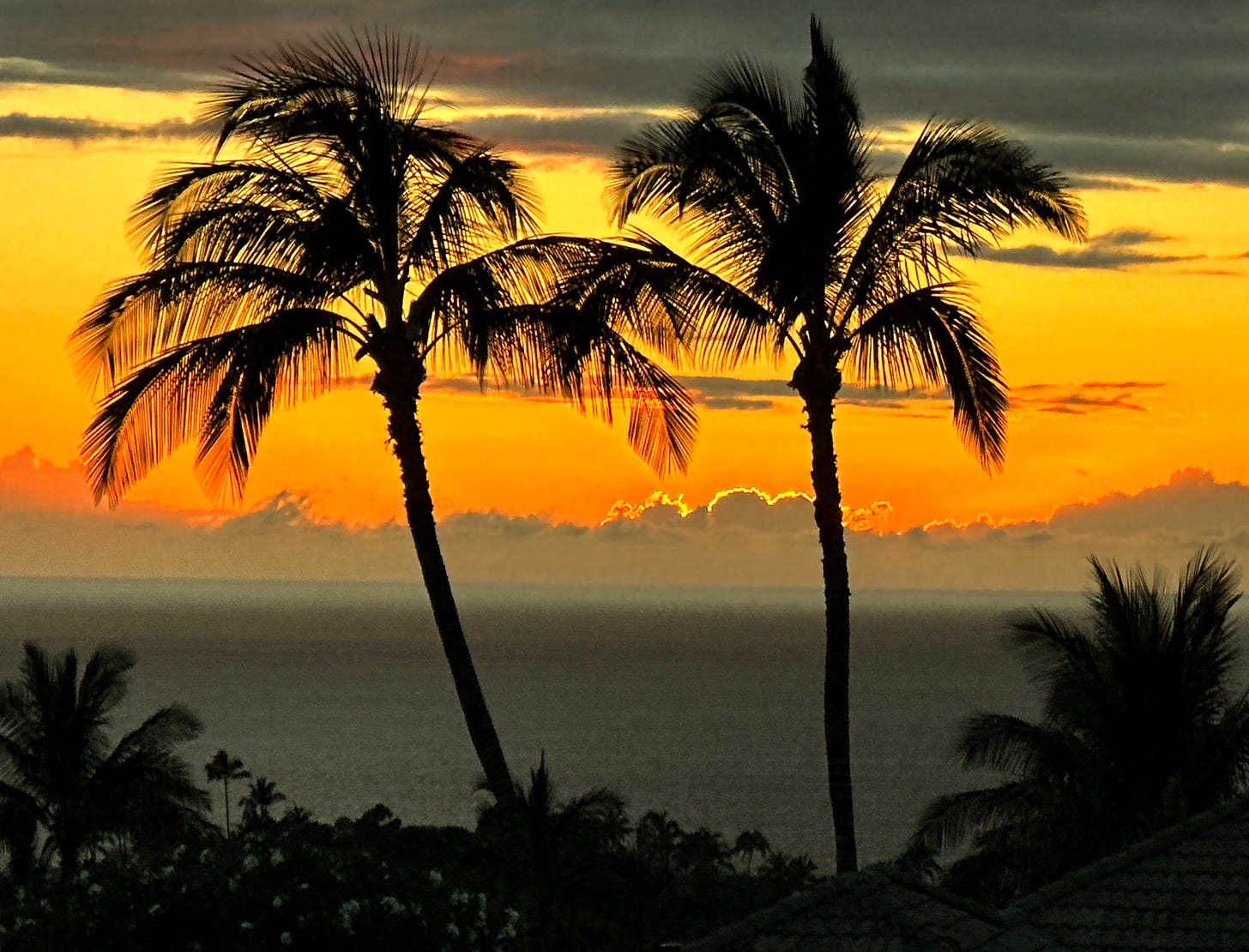Honoka'a, Mexican elections, EU clean energy milestone, the Moloch Trap, Neosporin, orangutan medicine, SpaceX suits
May 14, 2024 - The Nett Report
Every other week, the award-winning Nett Report provides readers with thoughtful perspectives helpful to navigating life in a changing world. Past issues can be found here (recent) and here (past four years).
Political Divide
“I wouldn’t live anywhere else,” she said, referring to Honoka’a
While visiting the Big Island of Hawaii last week on the Kohala Coast, we made a ritual stop up the hill to the town of Honoka’a, population 2,290. The purpose was breakfast at the Tex Drive-In and to purchase a week’s supply of the restaurant’s world-famous malasadas, a Portuguese doughnut without a hole. After breakfast, we drove down to the main street, and I sat on a bench too low for my legs in front of the Honoka’a Marketplace (see below) and talked with the woman running the store.
Honoka’a is a delightfully classic Hawaiian town, unspoiled by blatant commercialism. The old movie theater is now a venue for local musicians and visiting artists to perform. The storefronts include a place to refill containers with various sundries to avoid waste, real estate offices, two crystal shops, and the Papaloas Joe coffee shop, where I was served by the man who grows Hamakua coffee beans on a farm nearby. While he served me, he, talked with a local about hand-pollinating 300 hibiscus plants which would ultimately become tea. He didn’t want his picture taken. I asked if he had decaf, and the answer was “no,” but he made me a custom single-shot vanilla latte so I could taste the flavor of his local coffee.
Back at the Marketplace, I asked the woman about her life while she swept the concrete in front of the store. She told me she was born and raised in Honoka’a and wouldn’t live anywhere else. “It is so quiet and peaceful,” she said, “and people look out for each other.” I could only think how opposite this is to the political divides elsewhere.
Back at the home where we were staying, we watched the sunset.
Now back to the real world . . .
Mexican cartels kill rival candidates
According to a May 11, 2024, story in The Washington Post, Mexican cartels choose which candidate they want to support and then kill their rivals. “More than two dozen candidates have been killed leading up to the June 2 vote; hundreds have dropped out of the race. More than 400 have asked the federal government for security details. The campaign of intimidation and assassination is putting democracy itself at risk.”
The Gaza-Israel war has a different dynamic from each perspective
With negotiations between Hamas and Israel uncertain at best, an NPR interview on May 2, 2024, with strategic diplomacy expert Mickey Bergman illuminates understanding of the negotiations. Israel wants a return of 33 hostages and a 40-day cease-fire. Hamas wants a permanent end to the fighting, a return of Palestinian soldiers, and a withdrawal by Israeli forces. Palestine is looking for a described outcome. Israel’s Western view is that this is a negotiation with each party giving something in order to take back something. Hamas only sees a desired outcome. Initially, when Israel first entered Gaza, the steps to achieve that outcome seemed short. “Now, the more Israel got into Gaza, the more the situation has gotten worse, there were more steps to take to get back … into that certain outcome that Hamas demanded … From the Israeli point of view, that looks like they're [Hamas] just increasing their list of demands. And that is a dynamic, especially when it plays out in public, that makes it extremely difficult to get to an end, an agreement of a deal.”
Will Black Americans benefit from EV adoption?
Black communities have been disrupted by the automotive industry by highways bisecting Black neighborhoods and the resultant pollution causing health issues. According to a March 28, 2024, story in CapitalB, “a nonprofit news organization dedicated to uncovering important stories about how Black people experience America today,” Black communities stand to benefit the most from the cleaner air that results from electric vehicles. However, “Black workers and consumers have seemingly been left out of participating in the transition.” Only 2% of EV owners are Black, EVs are expensive, and lower income people are less likely to have chargers at home. In addition, “Black households are more likely to buy used vehicles across all income brackets, which is partly attributed to long-standing discriminatory practices in automotive financing.”
Climate Change
Venezuela the first country to lose all of its glaciers
At the beginning of the 20th century, Venezuela had six glaciers covering 386 square miles. Now, according to a May 9, 2024, story from UPI, the country’s last remaining glacier is gone. The Humboldt Glacier, once covering 450 acres, has shrunk to become an ice field at two hectares. A hectare is equal to 2.47 acres.
EU obtained only 23% of its electricity from fossil fuels in April
Growth in solar and wind energy and the recovery of hydro power resulted in the European Union only using fossil fuels for 23% of its electricity in April. According to a May 10, 2024, story in euronews.green, Germany saw the largest drop in fossil fuel generation in April when compared to last year. Overall, electricity from fossil fuels fell by 26 per cent in Germany representing 32 per cent of the total EU fall.
Exxon Mobil CEO suggests removing regulations and clean energy incentives
A Los Angeles Times story on May 7, 2024, reported that Exxon Mobil CEO Darren Woods said his company could be a key player in global efforts to combat the climate crisis “if only governments would remove burdensome regulations and stop wasting money on inefficient clean energy incentives.” He said “emerging technologies such as carbon capture and green hydrogen … will be the main drivers of climate progress.
The Moloch Trap and burning fossil fuels
Hanna Ritchie’s Sustainability by the Numbers newsletter on May 1, 2024, describes the Moloch Trap and how it impacts environmental problems. A Moloch Trap “explains a situation where participants compete for object or outcome X but make something else worse in the process. Everyone competes for X, but in doing so, everyone ends up worse off.” Using fossil fuel burning as an environmental example, she says “We burn fossil fuels because it offers us huge immediate benefits (energy) but at the expense of a stable climate in the medium-term. It’s in no single country’s interest to stop doing so because they will miss out on the short-term energy gains and will still have to deal with climate change if other countries keep polluting.”
Future of Work / The Economy
“Success is a journey not a destination.” - Ben Sweatband, author and psychologist
“Success only comes to those who dare to attempt.” - Mallika Tripathi, poetess, distinguished writer, and professor and head of Feroze Gandhi Institute of Engineering. & Technology
Sounds like AI to me
This quote from author Tom Robbins in his novel Skinny Legs and All (1990) sounds like artificial intelligence to me: “If there’s a thing, a scene, maybe, an image that you want to see real bad, that you need to see but it doesn’t exist in the world around you, at least not in the form that you envision, then you create it so that you can look at it and have it around, or show it to other people who wouldn’t have imagined it because they perceive reality in a more narrow, predictable way. And that’s it. That’s all an artist does.”
Health
Time passes by, people pass on
As I see more and more friends succumb to dementia or just pass, this refrain from a Kathy Mattea song seems relevant.
“Time passes by, people pass on. At the drop of a tear, they're gone. Let's do what we dare, do what we like, And love while we're here before time passes by.” - Kathy Mattea, country singer, Time Passes By
Neosporin might help protect from viral infections, including Covid
The common antibiotic neomycin, the active ingredient in Neosporin, could be a cheap, effective way to prevent and treat viral respiratory infections in people, according to an article in Medical News Today on April 26, 2024. A Vanderbilt University study on mice and hamsters proved effective in preventing infection by a strain of Covid and Influenza A. A small study with humans placing Neosporin in their nostrils also had positive results. Researchers say there is still more work to do until the treatment can be used for clinical applications. The results of the study were published in the journal PNAS.
The Nett Light-Side
In Sumatra, an orangutan is the first to use a medicinal plant on a wound
When an orangutan named Rakus used a medicinal plant to heal a wound under its eye, it became the first documented case of an ape using a plant with scientifically proven medicinal properties to treat a fresh wound. After being wounded in a fight, he chewed the leaves of a plant known as “akar kuning” with known medicinal properties. First, he ate the leaves and then chewed them in his mouth and made them into a paste he patted onto the wound. The story was reported in Science on May 2, 2024.
Space X reveals new, sleek space suit
SpaceX has revealed the design of the new, sleek space suits that will debut on the Polaris Dawn mission “no earlier than summer 2024,” according to a May 6, 2024, story in Popular Science. The suits will be used for the first commercial spacewalk. The EVA suit helmet is 3D printed from polycarbonate materials.
About Carl Nettleton
Carl Nettleton is an award-winning writer, speaker, thought partner, facilitator, and subject-matter expert regarding water, climate, sustainability, the ocean, and binational U.S.-Mexico border affairs. Nettleton Strategies, the consultancy he founded in 2007, is a trusted source of analysis and advice on issues at the forefront of public policy, business, and the environment. He helps people and organizations to think strategically about their options for change. He is also the founder of OpenOceans Global, a nonprofit addressing ocean plastic in a new way.










